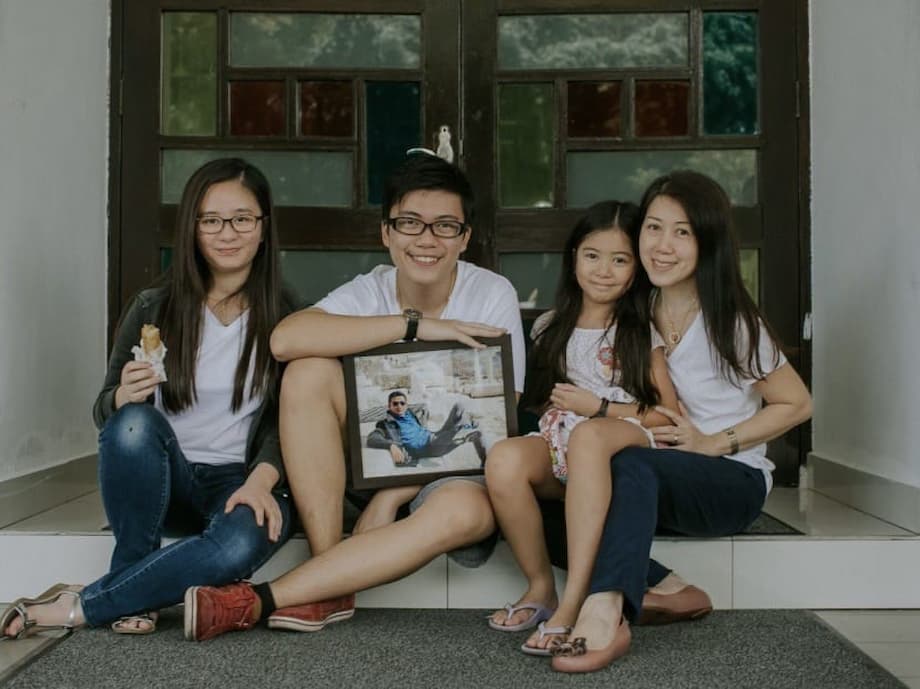The Journey of Cynthia Tay: From Grief to Leadership
Cynthia Tay’s life changed forever in March 2017, when she lost her husband, Jesse Peh, to cancer. Their story began as teenagers, blossoming through handwritten letters and culminating in marriage at 25. Together, they built a family with three children, with Cynthia as a homemaker and Jesse serving as a Republic of Singapore Air Force pilot. Their world was upended when Jesse was first diagnosed with stomach cancer in 2010. After a brief recovery, the cancer returned in 2015, this time terminal. Despite a grim prognosis, Jesse survived for over two years, giving the family precious time to create memories and confront the realities of impending loss.
- The Journey of Cynthia Tay: From Grief to Leadership
- Understanding Grief: The Unique Challenges of Widowhood
- The Birth and Growth of Wicare Support Group
- Healing Through Shared Experience: Cynthia Tay’s Leadership
- Resilience and Recovery: Stories of Hope
- Breaking the Silence: The Importance of Community Support
- In Summary
Jesse’s passing left Cynthia and her children grappling with profound grief and the daunting task of rebuilding their lives. The emotional and financial adjustments were immense—Cynthia sold their condominium and moved to an HDB flat to manage expenses. The sense of emptiness and isolation was overwhelming, a feeling familiar to many widows. Nine months after Jesse’s death, Cynthia attended a workshop by Wicare Support Group, a decision that would transform her journey through grief and ultimately lead her to chair the very organization that helped her heal.
Understanding Grief: The Unique Challenges of Widowhood
Grief is a deeply personal and often isolating experience, especially after the loss of a spouse. In Singapore, cultural norms can make open conversations about death and bereavement difficult. Many widows find that friends and family, though well-meaning, struggle to understand the depth of their pain. As Cynthia Tay observed, the pain of widowhood is unique, marked by the loss of a life partner and the sudden shift in identity and responsibilities.
Widows often face a complex mix of emotions: sadness, anger, guilt, and anxiety about the future. The practical challenges can be just as daunting—managing finances, parenting alone, and navigating social expectations. For children, the loss of a father can trigger fears and insecurities that require sensitive support. Cynthia’s experience echoes that of many others who have found solace in connecting with those who truly understand their journey.
Widowhood in Singapore: A Growing Community
Singapore’s rapidly aging population has led to a rise in the number of widows. According to government statistics, there were over 140,000 widows aged 50 and above in 2016, a number that continues to grow. The need for specialized support has never been greater, yet grief and bereavement remain taboo topics in many circles. This is where organizations like Wicare play a crucial role, offering a safe space for widows to share, heal, and rebuild.
The Birth and Growth of Wicare Support Group
Wicare Support Group was founded in 1993 by widows who recognized the healing power of peer connection. The group’s origins trace back to Joyce Lye, who lost her husband in a tragic car accident and was left to raise two young daughters alone. Joyce’s journey through anger, depression, and financial hardship eventually led her to embrace Christianity, which became a turning point in her healing. Encouraged by her faith and the needs of others, she began meeting with fellow widows, providing a space for mutual support. This informal gathering grew into Wicare, which now boasts over 1,100 widow members and 1,700 fatherless children.
Wicare is a voluntary, non-profit organization run by a network of volunteers who have themselves experienced loss. This peer-to-peer model ensures that every member is met with empathy, understanding, and hope. The group offers a range of services, from practical support and enrichment activities to structured grief programmes and workshops. Wicare’s mission is rooted in Christian values, but its doors are open to all, regardless of faith.
As Joyce Lye reflected on her journey, she credited her faith and the community of widows for her strength and growth:
“I never imagined I would become the founder of Wicare, Singapore’s only widow support group, or that I would have to share my story with hundreds of grieving women. But I am grateful for the opportunity to help others.”
Programmes and Initiatives: Helping Widows and Their Children
Wicare’s support extends beyond emotional comfort. The group organizes social gatherings, enrichment classes, excursions, and bonding sessions for widows and their children. These activities foster a sense of belonging and help members rediscover joy and laughter amid grief. Many lifelong friendships have been forged through Wicare’s community events.
Recognizing the unique needs of older widows, Wicare partnered with the National Council of Social Service (NCSS) to launch the Wishine programme in 2017. This nine-hour initiative combines individual counseling and group support sessions, offering widows a structured environment to process their grief. Wishine is the first programme of its kind in Singapore, and it is offered free of charge. Participants report feeling less alone and more understood, with many going on to support newly bereaved widows as befrienders.
Wicare also places a strong emphasis on supporting children who have lost a parent. Art therapy, encounter workshops, and family activities help children express their emotions and build resilience. As one mother shared,
“When I talk about my husband, my family tries to change the subject, afraid it will trigger sadness. But I want to remember him. At Wicare, I can talk freely and know others understand.”
Healing Through Shared Experience: Cynthia Tay’s Leadership
Cynthia Tay’s involvement with Wicare began as a participant seeking solace. She soon became a volunteer befriender, supporting newly bereaved widows through their darkest days. Her empathy and leadership qualities led her to the role of chairperson, where she now guides the organization’s mission to provide hope and healing.
Cynthia’s approach is rooted in the belief that open conversations about loss are essential for healing. She encourages widows to share their stories, confront their fears, and support one another. Her journey is a testament to the transformative power of community:
“The pain of widowhood is unique, but so is the strength that comes from walking this path together. Through Wicare, I found not just support, but a sense of purpose.”
Under Cynthia’s leadership, Wicare continues to expand its reach, raising awareness about the needs of widows and advocating for greater support at the societal level. The organization collaborates with other social service agencies, churches, and community groups to ensure that no widow has to face grief alone.
Supporting Children Through Grief
Helping children process the loss of a parent is a central part of Wicare’s mission. Grief can manifest in children as anger, withdrawal, or changes in behavior. Experts recommend that adults listen empathetically, encourage open dialogue, and provide age-appropriate explanations. Joan Swee, a grief recovery specialist and co-founder of Wicare, emphasizes the importance of naming losses and discussing fears for the future. She advises parents to be patient and avoid forcing children to talk before they are ready.
Wicare’s workshops and support groups for children use art, play, and storytelling to help young ones express their feelings. These activities reduce the stigma around trauma and foster resilience. As one panelist noted,
“Empathy, listening, and being present are the most powerful gifts we can offer grieving children.”
Resilience and Recovery: Stories of Hope
The journey through grief is never linear, and every widow’s story is unique. Katherine Ho, who lost her husband to pancreatic cancer in her 30s, found strength in Wicare’s community. She struggled with overwhelming sadness and the practical challenges of single parenthood, but listening to other widows’ stories gave her hope. Katherine now keeps her husband’s memory alive through daily routines and conversations with her children, focusing on what truly matters in life.
Joan Swee’s experience echoes this sentiment. After losing her husband to cancer, she faced immense emotional turmoil and the challenge of supporting two young sons. Through faith, reading, and support from fellow widows, Joan found healing and went on to become a grief recovery specialist. She now helps others move beyond loss, believing that recovery and restoration are possible for everyone.
These stories highlight the resilience of widows who, despite profound loss, find ways to rebuild their lives and support others. Wicare’s peer-to-peer model ensures that every member is met with understanding and hope, reducing the isolation that so often accompanies grief.
The Impact of the Covid-19 Pandemic on Grief and Support
The Covid-19 pandemic introduced new challenges for those grieving the loss of a loved one. Social distancing measures limited attendance at funerals and wakes, making it harder for families to say goodbye and receive communal support. Many bereaved individuals felt they had failed to give their loved ones a proper send-off, which could impede emotional healing.
Wicare adapted by offering virtual support sessions and encouraging members to connect online. The organization’s general manager, Lena Soh, noted that practical forms of support—such as cooking a meal or helping with childcare—were curtailed by pandemic restrictions. However, the importance of human presence, even if virtual, remained paramount. Technology bridged some of the gaps, with live-streamed funerals and online counseling becoming more common.
Despite these challenges, the pandemic also prompted some to focus on what truly matters, fostering deeper conversations about loss and resilience. As one bereaved daughter shared,
“Maybe it’s a blessing in disguise, that I’m fully facing the new reality of life without my mum.”
Breaking the Silence: The Importance of Community Support
Grief and bereavement are often seen as private matters, but the experiences of Cynthia Tay, Joyce Lye, Joan Swee, and countless others demonstrate the healing power of community. Support groups like Wicare provide a safe space for widows and their children to share their stories, process their emotions, and find hope together.
Wicare’s approach is holistic, addressing both emotional and practical needs. The group’s structured programmes, social activities, and peer support networks empower widows to rebuild their lives and support one another. By normalizing conversations about grief, Wicare helps reduce the stigma and isolation that so often accompany loss.
As Singapore’s population ages and the number of widows grows, the need for such support will only increase. Wicare’s mission is to ensure that no widow has to walk the path of grief alone, and its impact is felt in the lives of hundreds of women and children each year.
In Summary
- Cynthia Tay’s personal journey from widowhood to leadership at Wicare Support Group highlights the transformative power of peer support.
- Wicare was founded by widows for widows, offering emotional, practical, and social support to over 1,100 members and their children in Singapore.
- The group’s programmes, including the Wishine initiative, provide structured grief counseling and community for widows, especially those over 50.
- Supporting children through grief is a key focus, with workshops and activities designed to foster resilience and open communication.
- The Covid-19 pandemic introduced new challenges for grieving families, but Wicare adapted with virtual support and continued its mission.
- Wicare’s holistic, peer-to-peer approach helps reduce the stigma of grief and empowers widows to heal and support others.
- As Singapore’s population ages, the need for widow support groups like Wicare will continue to grow, making their work more vital than ever.












